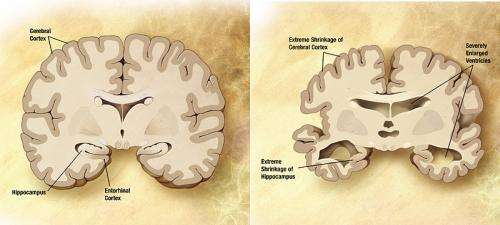Prostate cancer drug slows memory loss in women with Alzheimer's disease

Women with Alzheimer's disease showed stable cognition for a year when a drug that is more commonly used to treat advanced prostate cancer was added to their drug regimen, according to a new study from researchers at the University of Wisconsin-Madison.
"This is the first time any therapy has been shown to stabilize memory loss over a year," says Dr. Craig Atwood, co-lead author of the study and associate professor of medicine at the UW School of Medicine and Public Health.
The study was published today in the Journal of Alzheimer's Disease.
The clinical trial, initiated by Dr. Richard Bowen at the former Voyager Pharmaceutical Corporation, followed 109 women with mild to moderate Alzheimer's disease. Some were treated with the drug leuprolide acetate (Lupron Depot), used to treat cancer in men and severe endometriosis in women, and with an acetylcholineesterase inhibitor such as Aricept, which improves mood in people with the condition but does little to slow memory loss. Others taking an acetylcholineesterase inhibitor received low-dose Lupron alone or a placebo.
It found that the women treated with both Aricept and high-dose Lupron Depot had almost no decline (0.18 points) in their scores on the ADAS-cog, a test of memory, compared with declines of 4.21 for those taking an acetylcholineesterase inhibitor and low-dose Lupron and 3.3 in those only taking an acetylcholineesterase inhibitor after one year.
Atwood explained that earlier epidemiological studies involving hundreds of thousands of patients had found that men who had prostate disease and were treated with Lupron had a 34 to 55 percent decreased risk of developing Alzheimer's disease compared with prostate-cancer patients who didn't receive the drug.
He explained that Lupron acts to suppress gonadotropin-releasing hormone (GnRH), which is produced in the brain and controls ovulation in women and spermatogenesis in men. This in turn decreases the production of gonadotropins, hormones that regulate the synthesis of sex steroids like estrogen and testosterone. For these reasons, it is also used to treat estrogen-sensitive breast cancer, endometriosis, and premature puberty. Decreasing GnRH and gonadotropins with Lupron prevents some of the negative effects of elevated GnRH and gonadotropins on the brain, which occurs following menopause.
Post-menopausal women were chosen for this study because they no longer produce sex steroids; men could have been affected by the loss of testosterone caused by the Lupron.
"This promising combination therapy (acetylcholineesterase inhibitors and Lupron Depot) warrants testing in early and late stages of Alzheimer's disease," Atwood says. "However, since the company that performed this study is now out of business, it remains to be seen whether this therapy will ever be tested in further clinical trials and reach the market."
More information: Journal of Alzheimer's Disease, iospress.metapress.com/content/n207096671247200
















